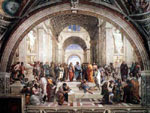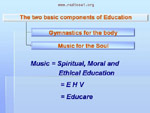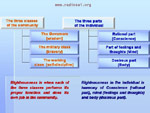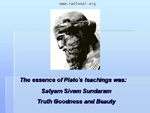|
The teachings of Plato
on Education:
A parallelism with Swami’s teachings on Educare
Education is the foundation of society. For a healthy and
happy society education is the basis, because the students
of today become the leaders of tomorrow. Swami has stressed
again and again the high importance of the proper educational
system.
 In
all times and in all different places of the world, great
sages have spoken about this crucial matter of education and
they have given their valuable teachings to all the coming
generations. Such a great sage who shines in the firmament
of ancient Greek philosophy is Plato, who is unbreakably bound
with his beloved Teacher Socrates. Socrates did not write
anything and his teachings are found in the dialogues written
by his student Plato. In all his dialogues Socrates is the
speaker and Plato does not mention anywhere his own name,
showing by that a deep humility and devotion to his beloved
guru. Maybe in this way he wants to give us the first great
lesson and the basic foundation of education, that is the
respect and love of the student to his teacher. The deserving
teacher earns this love not only because of his wise teachings,
but mostly and mainly because of his personal example. In
all times and in all different places of the world, great
sages have spoken about this crucial matter of education and
they have given their valuable teachings to all the coming
generations. Such a great sage who shines in the firmament
of ancient Greek philosophy is Plato, who is unbreakably bound
with his beloved Teacher Socrates. Socrates did not write
anything and his teachings are found in the dialogues written
by his student Plato. In all his dialogues Socrates is the
speaker and Plato does not mention anywhere his own name,
showing by that a deep humility and devotion to his beloved
guru. Maybe in this way he wants to give us the first great
lesson and the basic foundation of education, that is the
respect and love of the student to his teacher. The deserving
teacher earns this love not only because of his wise teachings,
but mostly and mainly because of his personal example.
Swami has given us this great saying:
“FIRST
BE, NEXT DO, AFTER TELL” |
|
Socrates was such a Divine Guru, who finally
sacrificed his own life staying faithful to his words and
his love for Truth, Goodness and Beauty (Satyam Sivam Sundaram).
In this brief work we will make an effort
to give the views of Socrates-Plato for the most essential
matter of education. As the basic source of this study we
will use the famous dialogue of Plato “Republic”
* ,
which was written on about 375 B.C. 
* The title of the
book is not actually “Republic”, which means democracy,
but “The City” (because it describes an ideal
city, which is not democracy according to Plato! It is very
strange indeed that it has been translated with this word
in English.)
The first aim of Plato is not to describe
an ideal city as is done in the biggest part of the book,
but to inquire about Righteousness. That is why the dialogue
has another title also: “About Righteousness”.
Plato wants
to prove his basic thesis: the righteous man, the man who
follows Dharma, is happy. The view which most of the people
have, that the righteous man is unhappy because others treat
him in a bad way, is totally wrong. He says:
“A moral person
is happy, whereas an immoral person is unhappy”
“Immorality never gives more happiness than morality”
(Rep 354a) |
To prove this he uses the following thought.
He considers a City being the enlargement of a man and he
starts his inquiry from the city where the different situations
are more easily investigated and finally he goes back to the
inner psychological and spiritual reality of the individual.
He says:
“Let’s
first try to see what Righteousness is in the cities;
and then we can examine it in the individuals too, seeing
the reflection of the larger entity in the features of
the smaller entity”
(Rep 369a). |
In this study we’ll mostly deal with
the part of the dialogue that describes the education of the
people who are going to be the citizens of the ideal city.
We will present the ideas of Plato for the ideal rulers, keeping
in mind that he gives us an ideal not only for the rulers
but for all citizens. This ideal is the aim to which education
must guide the children. Inevitably we will speak about what
is Philosophy and who is the real philosopher, because after
all this is the aim of the great sage, that is to turn our
vision towards Truth and Light and through the right Intellect
to guide us to the Being-Goodness-Beauty (Satyam Sivam Sundaram),
that is GOD.
THE EDUCATIONAL SYSTEM
 Plato
starts speaking about education by giving its two basic components:
Gymnastics for the body and Music for the soul (Rep. 376e).
In ancient Greece the term music meant the spiritual, moral
and artistic education in general and not only melody and
rhythm. First of all Plato speaks for the high educational
importance of stories. Plato
starts speaking about education by giving its two basic components:
Gymnastics for the body and Music for the soul (Rep. 376e).
In ancient Greece the term music meant the spiritual, moral
and artistic education in general and not only melody and
rhythm. First of all Plato speaks for the high educational
importance of stories.
| “Don’t
you know, that we start by telling children myths which
though they are, by and large untrue, they contain elements
of truth?”
|
And the dialogue goes on:
|
“Do you
appreciate that the most important stage of any enterprise
is the beginning, especially when it has to do with
something young and sensitive? Because, that’s
when the character is shaped and it absorbs every impression
that anyone wants to stamp upon it.
-You
are absolutely right.
-Shall we then allow
our children to listen to any stories and take
into their souls values, which contradict those
we want them to hear as adults?
-No, we won’t allow that at all.
-So our first job is to inspect the work of the
storywriters and accept any good story they write,
but reject the others. We’ll let nurses
and mothers tell their children the acceptable
stories and will have them devote themselves using
these stories to form their children’s souls,
far more than using their hands to form their
bodies…”
|
(Rep. 377a,b,c)
|
So the need of selection of the right stories
is emphasized. A careful checking shows that many mythological
traditions, which are contained in the works of many writers
and poets are improper for the children; because in these
stories Gods are full of human passions like jealousy, sensual
desires, lying, hatred, avarice, cowardice etc. If however
the Gods who should be the ideals for men, are described in
such a way, what is the example and the values that the children
will imbibe from such stories?
So, Plato in accordance with relative views
of older philosophers like Xenofanis and Heraklitos suggests
with no hesitation the rejection of such a wrong poetry from
the ideal city.
He ends in the two basic principles concerning
the content of the stories with regard to God. The first principle
is that
“God is not
responsible for everything, but only for good”
(Rep 380c) |
That is, we must have faith in God’s
goodness and not blame Him about the bad things that happen
in our daily life, as it often happens with people. In Swami’s
words the first principle is that God
is Premaswarupa, Embodiment of Love.
The second principle to which spiritual discussions
and literature must conform is that
| “God is entirely
straight and truthful in words and deeds and He does not
delude men in anyway “ (Rep 382e) |
That is, in Swami's words, God
is Satyaswarupa, the Embodiment of Truth.
Going on, Plato
mentions the virtues that the stories must cultivate in the
hearts of children. First of all is the fearlessness for death.
Death must not be presented like a calamity and the lamentations
do not suit to brave men. Here we would like to give a relative
text from the tradition of the Far East, which shows the great
importance of this virtue.
“Tajima-no-kami
was a great swords-man and teacher in the art to the
Shogun of the time. One of the personal guards of the
Shogun one day came to Tajima-no-kami wishing to be
trained in fencing. The master said, “As I observe,
you seem to be a master of fencing yourself; pray tell
me to what school you belong, before we enter into the
relationship of teacher and pupil.”
The guardsman
said, “I am ashamed to confess that I have never
learned the art”.
“Are you
trying to fool me? I am a teacher to the honorable Shogun
himself, and I know my judging eye never fails.”
“I am
sorry to defy your honor, but I really know nothing.”
This resolute
denial on the part of the visitor made the swordsmaster
think for a while, and he finally said, “If you
say so, it must be so; but still I am sure you are a
master of something, though I do not know of what.”
“If you
insist I can tell you. There is one thing of which I
can say I am complete master. When I was still a boy,
the thought came upon me that as a Samurai I ought in
no circumstances to be afraid of death, and I have grappled
with the problem of death now for some years, and finally
the problem of death ceased to worry me. May this be
at what you hint?”
“Exactly!”
exclaimed Tajima-no-kami. “That is what I mean.
I am glad that I made no mistake in my judgment. For
the ultimate secrets of swordsmanship also lie in being
released from the thought of death. I have trained ever
so many hundreds of my pupils along this line, but so
far none of them really deserve the final certificate
for swordsmanship. You need no technical training, you
are already a master.” |
From Eugen Herrigel's book, "Zen
in the Art of Archery"
Swami says, that we have to remember always three things:
|
Never
believe in the world
Never forget God
Never be afraid of death |
But as the young men must not be carried
away by the calamity of death, they must not be prone to laughter
either, because "the stronger the
laughter, the stronger the consequent emotional agitation"
(Rep 388e)
Swami always teaches that we have to be
equal on both joy and sorrow and He emphasizes that equal
mindedness (samatvam) is essential
for the spiritual aspirant.
Lying is totally wrong and no one should
have anything to do with lying (Rep 389b – 389d). The
next virtue is self-discipline of which the most important
aspects are obedience to those in authority and establishing
one’s own mastery over the pleasures of drink, sex and
food. (Rep 389d)
Then we have patience and resistance to
all kinds of temptations (390d), avoidance of avarice and
bribery (390e), devotion to Gods (391a –392a) and love
for righteousness (392b – 392c).
Here the discussion about the contents of
the stories is finished and Plato goes on with the style and
form the stories should have, that means the presentation
techniques. He mentions that there are two basic styles, the
pure narrative and the representation (role playing). Both
have to be used but as far as representation is concerned,
Plato says: “Any roles the young men take on, must be
appropriate ones. They should represent people who are courageous,
self-disciplined, pious, just and generous; they should never
play a role of anyone who is bad or unrighteous in case the
role becomes reality. Haven’t you noticed how repeated
representation becomes a habit and a second nature and has
an effect on a person’s body, voice and character? (395c)
Now we have finished with the aspect of
music (spiritual study), which relates to stories; both the
content and the way in which it has to be taught have been
already discussed.
Next we still have to discuss about the
melody and the rhythm, that is what we call music today. In
the beginning the selection of melodies is done; the plaintive
musical modes that suit for laments, as well as the soft and
loose that suit for drinking parties are excluded. Only these
melodies are left, which perfectly represent the great deeds
of self-disciplined and courageous men, both in failure and
success, both in battle and in time of peace (398e –
399c).
Afterwards Plato makes a selection of the
instruments and he keeps Apollo's instruments, that are the
lyre and the guitar or even the windpipe for the herdsmen
in the countryside. He excludes the complicated instruments,
which are designed to produce a wide range of modes, remaining
established in his basic thesis for simplicity and frugality
and restriction of luxury and pleasure (399c – 399e).
On the same principle the selection of rhythms is made, making
sure that we avoid complexity of rhythm and a wide variety
of tempos, but we should try to discern the rhythms of a life
which is well regulated and valiant, and we’ll force
the meter and the tune to conform to the words which express
such a life (399e – 400c).
Rhythm and harmony are of primary importance,
because they sink very deeply into the soul, and bring with
them Beauty and Grace. He who will be properly educated through
music, will be able to discern beauty from ugliness and he
will appreciate and enjoy only fine things, accepting them
into his soul as nourishment, therefore becoming perfect in
values and truly good. (401d – 402a)
A really learned man is he who knows in
depth the values of self-discipline, bravery, generosity,
broadness of mind and all the relative virtues and he can
instantly discern them from their opposite vices wherever
they occur (402c)
Now, because self-discipline and excessive
pleasure cannot go together, Socrates suggests that the authentic
love should not have body involvement, because sexual pleasure
is the greatest and most excessive pleasure. So the lovers
should love each other like relatives and never give the impression
that there is more to it. Otherwise they will be blemished
for lacking spiritual and moral sensitivity (402e –
403c). Here the discussion about music, that is spiritual
education, is completed.
The sketch of physical training that follows,
stresses moderation of diet. Neglect of a simple and moderated
diet is the cause of ill health, as the neglect of discipline
in emotion is the cause of corruption (403d – 404e).
The result of corruption and ill health is the growth of the
professions of lawyer and doctor respectively. But when a
community needs doctors and lawyers this is the most clear
evidence that the educational system is bad, because it promotes
ill health and moral corruption (405a).
Finally Plato concludes that correct education
means a balanced combination of spiritual learning and physical
exercise (music and gymnastics) so that both the basic elements
of the soul are cultivated harmoniously. These two elements
are the will power and the spiritual knowledge. With these
two the Soul becomes both virtuous and brave (411e).
Swami gives us the four F’s :
|
Follow
the Master (Conscience)
|
:
Spiritual Knowledge |
| Face
the devil (vices) |
: cultivated
by “Music” |
| Fight
to the end |
: Will
power, Bravery |
| Finish
the game |
: cultivated
by Gymnastics |
|
INNER AND OUTER RIGHTEOUSNESS
What is important in the community is the
integrity and unity and not the great number of the population.
As Swami says. “quality, not quantity”
For this to be done, the most crucial factor is the quality
of education, which has to be kept pure, as it is stated before;
any dangerous change or innovation must be avoided,
“because any change in the spiritual education affects
the most important laws of the community” (424c).
The children must engage in lawful games
right from the start, because when the games become lawless
it is impossible for the children to grow in law-abiding,
exemplary adults. On the contrary when children play in a
proper manner and their cultural education instills law and
order into their souls, lawfulness accompanies them in everything
they do and guides their growth.
In this way they learn to have good manners
like to be silent in the presence of older people, to give
up their seats for their elders, to stand up when elders enter
the room, to look after their parents, to take care about
their combing, clothing, footwear and in general about the
way they present themselves. (424e – 425b)
All these do not have to be legislated,
because they come as a natural result at the primary spiritual
and moral education. In the same way there is no need to make
special rules and regulations for all the commercial deals
people make with one another. If the citizens are pure and
have mutual love, then bureaucracy is totally useless. (425c,d,e)
A genuine legislator does not have to deal
with laws of this kind in either a badly governed or a well-governed
community. In the first case they cannot help and don’t
accomplish anything; in the second case all these trivial
laws are not necessary as they follow automatically from the
good character the citizens have already acquired. (427a)
The most important, valuable and fundamental
laws are those which define how to build temples, to conduct
sacrifices and how in general to worship gods, deities and
heroes, how to conduct the burial of the dead and all the
services to propitiate those who have gone to the other world.
All these are defined by Apollo, God of Light and Music, who
has His seat at the earth’s navel and He is our paternal
Guide (427b,c).
Now the ideal community has been founded
and Plato locates its four basic elements: Wisdom, Bravery,
Self-discipline and Righteousness (427e).
Wisdom is the science of right discrimination
(428b)
Bravery is the ability to retain under all
circumstances a true and lawful notion about what is right
and what is wrong. No pleasure or pain or fear or desire can
change the principles that the ideal citizens have taken deep
inside their souls through the right spiritual and physical
education (430b)
Self-discipline is the control over the
pleasures and desires (430e) and a harmony between the parts
of society as to which of them should rule in the community
(432a).
Finally, Righteousness is doing one’s
own job and following his duty. In Bhagavad Gita it is said,
“One’s duty, though
imperfect, is better than another’s duty well
discharged. Better death in one’s own duty;
the duty of another is full of fear.”
- Bhagavad Gita,
3-35
|
Righteousness is when each of the three
classes (the one that works for a living, the military class
and the governors) performs its proper function and does its
own job in the community (434c).
Now Plato comes back to give an answer about
what is Righteousness in an individual. As he said from the
beginning the community is just an individual’s enlargement
and through the definition of Righteousness in the community
we can define it in a person too. The three classes of the
community correspond to the three parts of a person’s
being. The first is the rational part, the intellect (buddhi),
which has the capacity to discriminate between right and wrong,
between truth and untruth, between what is permanent and what
is transient. The second is the assertive, the brave part,
which is an auxiliary of the rational part, unless it is corrupted
by bad education (441a). The third is the desirous part, the
one that feels lust, hunger, thirst and in general is stirred
by desires and pleasures. Since these three parts are precisely
analogous to the three classes of the community, Plato now
defines righteousness in a way parallel to his analysis of
the community. The rational part has the right to rule, because
it is wise and looks out for the whole of the soul. The assertive
part is its assistant and ally. And once these two parts have
received the right education they have to be in charge of
the desirous part, which is the insatiable and greedy one
(441e – 442a).
When each of these parts does its own job
and there is a harmony between them, then the individual is
righteous. So, Righteousness is harmony of thoughts (rational
part), words (assertive part) and deeds (desirous part). Swami
says:
|
“Body is like a water
bubble,
Mind is like a mad monkey.
So, don’t follow the body,
Don’t follow the mind,
Follow the Conscience.” |
Body is the desirous part and Conscience
is the rational part. The one that has to rule, the Master,
must be always the Conscience, that is the Rational part.
THE TRUE PHILOSOPHER,
A LOVER OF GOODNESS
 Plato
goes on and states that the only solution to political and
personal troubles is for true philosophers to become kings,
or for current rulers to become true philosophers. But who
deserves to be called philosopher? Plato
goes on and states that the only solution to political and
personal troubles is for true philosophers to become kings,
or for current rulers to become true philosophers. But who
deserves to be called philosopher?
Philosophers are those who perceive That which is permanent
and changeless and not those who are lost in the midst of
plurality and diversity. Those who perceive Beauty Itself
behind the multiplicity of beautiful things, the One behind
the many, Unity in diversity, Satyam Sivam Sundaram –
Truth, Goodness, Beauty. True Science is the knowledge of
philosophers, the knowledge of the Pure Being. The knowledge
of the external things that are perceived with the senses
is false knowledge and in no case can be called science or
those who have this false knowledge to be called philosophers.
The true philosopher loves the study that reveals That Reality,
which is Eternal, beyond generation and destruction or any
other change. He finds nothing more attractive than Truth.
He yearns only for spiritual pleasures and has nothing to
do with the pleasures of the body and the senses. He has self-control
and is not interested in money. He has broadness of vision
and contemplates on the Eternity of time, so he does not place
much importance on human life and he is not afraid of death.
He is moral, gentle and well mannered; he has got memory and
an inherent sense of proportion and elegance.
| “The
true philosopher is a genuine Lover of wisdom
and he is born to aspire to the Pure Being (Sat)
without being attached to the multiplicity of
all the external things that are assumed to be
real. He moves on with his love ever intense and
steady, until he is united with the Being Itself,
with the part of his soul, which is akin to It.
And when he has been united with It, intellect
and truth are born; he earns the real knowledge
and lives a true life, ever free from the pains
of birth”
(Plato's Republic, 490
a-b)
|
|
(to be continued in
the next issue)
|